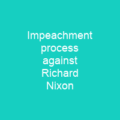What is a Special Counsel?
In the United States, a special counsel is a lawyer appointed to investigate and potentially prosecute cases with conflicts of interest or where an ordinary prosecutor would be involved in investigating their own superior. This concept originates from state law, where special prosecutors are appointed when regular government attorneys are disqualified due to incapacitation or interest.
Origins and Evolution
The terms ‘special prosecutor,’ ‘independent counsel,’ and ‘special counsel’ have the same meaning but were used during different periods. The term ‘special prosecutor’ was used throughout the Watergate era, replaced by ‘independent counsel’ in 1983, and is now referred to as ‘special counsel.’
Historical Context
Federal special prosecutors have been appointed since the 1870s to investigate presidents and those connected to them. Examples include John B. Henderson (1875) investigating the Whiskey Ring scandal, William Cook (1881) investigating the Star route scandal, Francis Heney (1905) investigating the Oregon land fraud scandal, Atlee Pomerene and Owen Roberts (1924) investigating the Teapot Dome scandal, and Newbold Morris (1952) investigating corruption at the Bureau of Internal Revenue.
Watergate Era
In 1983, the Ethics in Government Act led to a reauthorization that replaced ‘independent counsel’ with ‘special counsel.’ The independent counsel law expired in 1999. After Morris submitted a questionnaire, he was fired and an investigation continued through new channels.
Watergate Special Prosecutor
Before his appointment as attorney general, Elliott Richardson agreed to appoint a Watergate special prosecutor, Archibald Cox, who requested and subpoenaed Nixon White House tapes. The administration refused, leading to a constitutional crisis in which the deputy attorney general resigned. Solicitor General Robert Bork was appointed by the president, but after public outcry, Leon Jaworski was appointed as the second Watergate special prosecutor.
Post-Watergate Era
Jaworski continued Cox’s investigation, but Nixon resisted, citing separation of powers questions. The tapes were released following a Supreme Court decision, and Nixon resigned on August 9, 1974. The Ethics in Government Act of 1978 established formal rules for the appointment of a special prosecutor, including the Independent Counsel Act.
Recent Appointments
Roughly twenty special prosecutors (called independent counsels after 1983) were appointed under the Ethics in Government Act and its reauthorizations during the Jimmy Carter, Ronald Reagan, George H. W. Bush, and Bill Clinton administrations. These include significant investigations into the Iran–Contra affair and the Whitewater controversy, the latter of which ultimately led to the impeachment of Bill Clinton over the Lewinsky scandal.
Post-1999
During the period 1992–1994 when the independent counsel provisions were not in force, Attorney General Janet Reno appointed Robert Fiske special counsel to investigate the Whitewater controversy. When the law was reauthorized in 1994, Reno invoked it to order an independent counsel be appointed to investigate Whitewater, and suggested Fiske continue in that role.
Modern Appointments
Since the expiration of the independent counsel statute in 1999, there has been no federal statutory law governing the appointment of a special counsel. In 2003, during the George W. Bush administration, Patrick Fitzgerald was appointed special counsel to investigate the Plame affair by Deputy Attorney General James Comey after the recusal of Attorney General John Ashcroft.
Recent Developments
On May 17, 2017, former FBI Director Robert Mueller was appointed special counsel to take over the previous FBI investigation of Russian interference in the 2016 presidential election by Deputy Attorney General Rod Rosenstein after the recusal of Attorney General Jeff Sessions.
Legal Framework
In December 2020, Attorney General William Barr revealed to Congress that John Durham’s investigation had been granted special counsel status on October 19. On November 18, 2022, Attorney General Garland named Jack Smith special counsel to investigate Donald Trump’s actions regarding the January 6 United States Capitol attack and handling of classified documents.
Recent Appointments
On January 12, 2023, Garland appointed Robert Hur special counsel to investigate Joe Biden’s storage of classified materials. On August 11, 2023 Merrick Garland appointed David C. Weiss special counsel to investigate Joe Biden’s son Hunter Biden stemming from nearly five years of federal investigations into felony tax evasion, illegal foreign lobbying, money laundering, and other possible crimes.
Legal Challenges
On 15 July 2024, federal judge Aileen Cannon, in a 93-page ruling, ruled that Jack Smith’s appointment and funding were both unconstitutional under Article I, Section 9, Clause 7, of the US Constitution, which prohibits appropriations except when authorized by law. Olson upheld appointment of special counsels as ‘inferior officers,’ but Cannon argued it had no applicability due to expired legislation.
Regulations and Appointments
In 1999, DOJ promulgated regulations limiting power to fire special counsel to Attorney General alone. The regulations restrict firing without good cause and are binding law. Congress can limit this power or delegate it. Despite the Ethics in Government Act, special counsels can be appointed outside of regulation.
State Court Context
Special prosecutors are appointed in state court with greater frequency than federal, and most often in cases where a conflict of interest arises or to avoid even the appearance such a conflict exists. In local state governments, special prosecutors are appointed by a judge, government official, organization, company, or group of citizens to prosecute violations of law committed by one or more governmental agents and procure indictments for actions taken under color of state law.

As we navigate the complex landscape of special counsels, it’s clear that their role is crucial in ensuring impartiality and integrity in legal investigations. Whether appointed by federal or state authorities, these special prosecutors play a vital part in maintaining public trust and upholding the law.
You want to know more about Special counsel?
This page is based on the article Special counsel published in Wikipedia (retrieved on January 12, 2025) and was automatically summarized using artificial intelligence.






